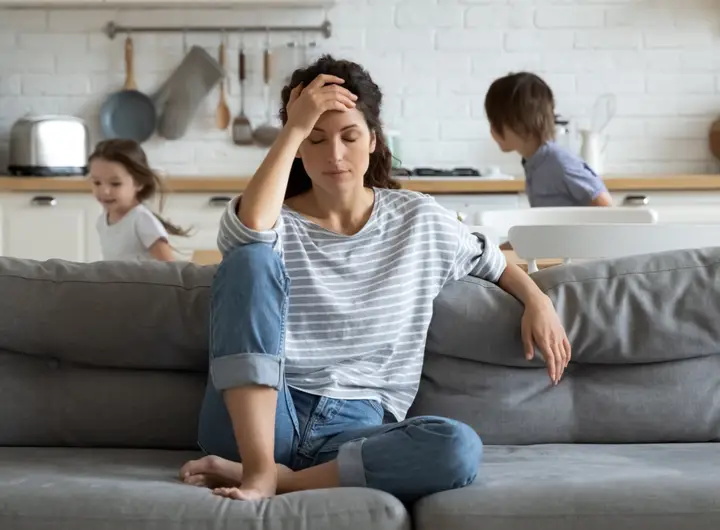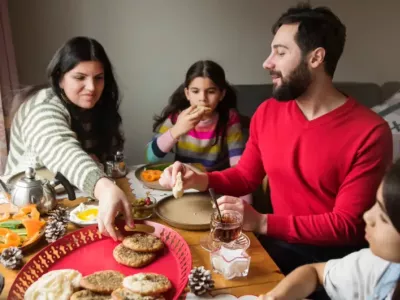Supporting Stressed Parents

Is it getting harder to be a parent?
Being a parent is one of the most important roles of our lives. Parents are responsible for providing their children with a loving, safe and secure environment to grow and learn.
Canadian and global reports describe parents’ increased stress and burnout1. Fewer young people wish to become parents and of those who do, many prefer to have only 1 child. Canada has recently recorded its lowest ever birthrate2.
Canada faces a cascade of challenges as stressed parents experience mental health challenges that impair their ability to care for their children. Governments and communities are working hard to support those who choose to become parents.
The future of our communities depends on our ability to reduce the stress of parenthood, so that families can engage with their children in loving relationships and guide their development.
What makes it so hard to be a parent in 2025?
Becoming a parent brings numerous challenges. Juggling work and family responsibilities, parents know it’s often hard to find enough hours in the day for all that needs to be done. The financial burdens to pay for childcare, housing, food, clothing and children’s activities are hard for all parents, and especially acute for those parenting alone or in precarious employment.
Concerns about climate change and weather-related disasters
Exposure to weather-related disasters taxes parents’ emotional and financial resources. Emotional resilience becomes depleted and some are concerned that they do not wish to bring children into an uncertain world.
Confusing and conflicting messages
One huge challenge is sifting through the confusing and conflicting messages about the best way to care for children. Everyone has a strong opinion. In addition to family, friends, healthcare and education professionals, social media influencers, and countless ‘experts’ offer their prescriptions for the best way to parent or to handle parenting challenges. It’s not surprising that many parents feel disempowered as they search for the ‘right way’ to help their children.
Blame and criticism
In a climate of criticism and blame it is easy to feel that you have got it wrong. Both in-person and social media putdowns increase parents’ distress and lead them to second guess their choices3.
How can Triple P help?
The Triple P system embraces five principles of positive parenting that apply universally to families. Two of these principles are especially helpful in reducing parentings stress. Developing realistic expectations for yourself and for your child is essential in reducing stress. Recognizing that some problems are common at different ages can help parents feel less frustrated. Remembering that no parent is perfect and all make mistakes sometimes can help parents to blame themselves less. The principle of taking care of yourself as a parent reminds parents that one of the kindest things they can to help their children is to set a good example in looking after themselves, taking a brief break, and making sure they are compassionate towards themselves.
Deciding on what changes you’d like to see
Although the principles are universal, each parent is invited to choose the specific goals for their family. In Triple P programs, parents are encouraged to select the goals that are important to them. These are always phrased positively, so they describe what the parent would like to see or encourage in their child, rather than labeling the problem.
Picking the strategies you would like to try
Triple P offers a range of strategies that parents can choose from. All of the strategies Triple P teaches are those found in evidence-based programs that are endorsed by the world health organization(who)4. That means that all of the strategies taught in Triple P programs have been subject to robust research in many countries and have been found helpful by thousands of parents.
Choosing how to nourish the parent-child relationship
We can think of the Triple P strategies as nutrients for the parent-child relationship. The strategies offered in Triple P all nourish family life. All the parenting strategies taught in Triple P programs are helpful to some families, some of the time, in some circumstances. There are simply no one-size fits all strategies that work for everyone all the time in all circumstances. In selecting among strategies proposed by Triple P there are no bad decisions or choices; no parent has to do something that doesn’t fit for them. If one strategy doesn’t feel right there are always other options.
Knowing that something is ‘good for you’ is not enough. Triple P has developed a menu of options so parents can choose how they receive support.
Choosing how to get support
Programs vary in intensity. Some parents or caregivers may be interested in attending a single session, others might prefer to attend a full course over several weeks. Parents can also choose the modality–whether they want to receive support in one-to-one sessions, in a group, or perhaps complete a program on-line.
Active learning
In all Triple P programs, parents are in the driver’s seat. They are the experts on their child. Parents learn about, then try on or practice new strategies, figuring out the wording and timing that works in their family, as well as the circumstances in which a strategy could be helpful.
As they gain confidence and put new ideas into practice in their daily lives, parents learn to recognize and be proud of the ways they make a difference in their children’s lives. Triple P helps parents to feel good about parenting.
Let’s start with the positives
When we’re stressed, discouraged, or burned out, it is easy to see only the negatives. When we’re feeling low we tune in to mishaps, mistakes, disappointments, and how things fall short of our ideal.
Across all Triple P programs, parents learn to focus first on what’s going well, what’s positive, or what they might be proud of. Once the positives have been acknowledged, we turn attention to the parts that were more problematic, inviting parents to think of what they might like to do differently the next time they face a similar challenge.
This sounds great in theory…
The covid-19 pandemic challenged families across the globe. Research in québec showed that parents who received Triple P services prior to the pandemic were able to sustain the gains they had made, even in the face of lockdown5. In the face of unimaginable stress, these parents sustained their ability to provide a safe environment for their children. By investing in effective, inclusive and accessible, evidence-based resources such as Triple P, we ensure long term benefits for society in terms of reducing parent stress, preventing problems for parents and children, and empowering families.
References
- Lavoie, A. & Auger, A. (2023). Être parent au Québec en 2022. Un portrait à partir de l’Enquête québécoise sur la parentalité 2022, [En ligne], Québec, Institut de la statistique du Québec, 336 p. statistique.quebec.ca/fr/fichier/etre-parent-quebec-2022.pdf.
- Provencher, C. & Galbraith, N. (2024). Fertility in Canada, 1921 to 2022, [Online], Canada, Statistics Canada, 28 p. https://www150.statcan.gc.ca/n1/en/pub/91f0015m/91f0015m2024001-eng.pdf?st=68BcgM5A.
- Experiencing Parental Guilt. (s. d.). https://amiquebec.org/parental-guilt/
- WHO guidelines on parenting interventions to prevent maltreatment and enhance parent–child relationships with children aged 0–17 years. Geneva: World Health Organization; 2022. Licence: CC BY-NC-SA 3.0 IGO
- Gagné, M.-H., Piché, G., Clément, M.-È., & Villatte, A. (2021). Families in confinement: A pre–post COVID-19 study. Couple and Family Psychology: Research and Practice, 10(4), 260–270. https://doi.org/10.1037/cfp0000179
